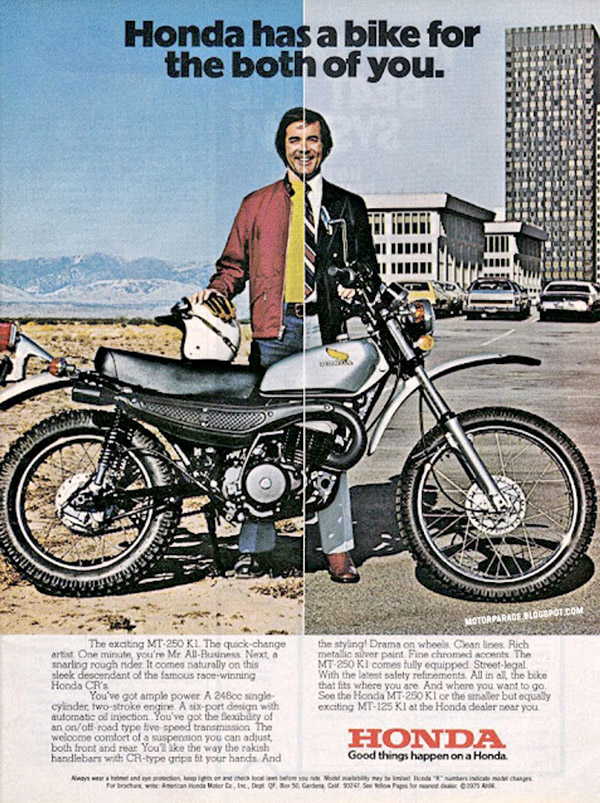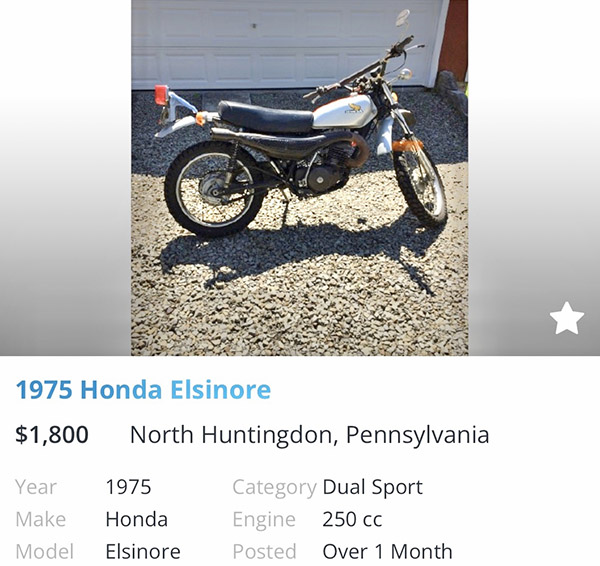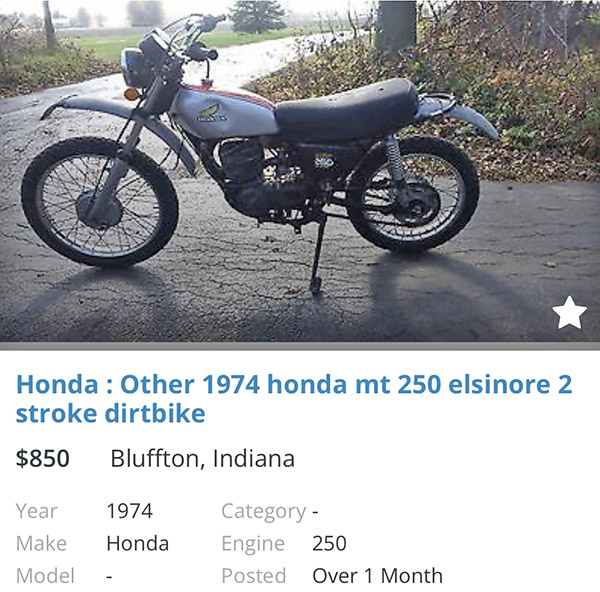The first motorcycle that I couldn’t hold the throttle wide open through the gears was a CR250 Honda Elsinore. I was around 16 years old and had ridden other 250s: Suzukis, Yamahas, 4-stroke Hondas. They were enduro bikes with heavy flywheels and mild porting. The Elsinore was a full-on motocross bike and I had never experienced a real, racing motorcycle.
When I left the line Wide-eFfin’-Open like I normally did the front wheel was climbing into the sky and at the same time the rear tire was shooting rocks and dirt 50 feet behind. The only thing that kept it from flipping over was lack of traction. Each time I shifted gears the front wheel came off the ground and a fresh torrent of debris issued forth from the squirming back tire. It was a breathtakingly fast motorcycle.
It was so light, so powerful, the engine ran clean throughout the rev range, and the suspension was the best I had ever ridden. The steering was telepathic and the bike could fly through the air like Superman. By the time I was topped out in 4th gear the bike was starting a slow, gentle weave and the two-track dirt trail I was on had grown very narrow. I had to lift. I never even made it to top gear. What a motorcycle!
The MT250 was not like that. It was a mild-mannered bike and Honda’s first modern two-stroke street bike. In the mid 1970s street legal, 250 two-stroke enduro bikes were wildly popular. Honda made a decent but heavy 4-stroke enduro. To compete with the other guys Honda had to lose the valve train and build one of those confounded “Thinking Man’s” engines. Honda building a two stroke street bike was earthshaking news in the 1970’s motorcycle world. It stirred up passionate opinions, like when Bob Dylan went electric.
The MT250 looked a lot like a real Elsinore except it had gauges, lights and blinkers. The gas tank was steel instead of artificially aged aluminum. The frame was regular steel not chrome-moly like the race bike. It even mixed the oil and gasoline automatically like Yamaha’s Autolube. All these changes added weight but you could get a plate for the thing and ride it to high school.

If my memory has not failed completely I remember the motorcycle magazines of that era being slightly disappointed with the new two-stroke Honda. How could such a milquetoast motorcycle come from the fire-breathing CR250 Elsinore? I guess they were expecting a motocross bike with lights. Eventually one of the magazines did just that. Here again, I may be imagining this but I seem to remember one of the magazines putting a CR250 top end on a MT250. And that was all it took. The heavy flywheel with the CR porting made for a fast, powerful 250 that wasn’t so abrupt that it would spit you off.

I loved the style of the first CR250s and there hasn’t been a better-looking dirt bike built. I’ll go even further: the early CR250 is one of the all-time best-looking motorcycles of any category since forever. The MT inherited a lot of the CR’s style and it flat looks great. The engine was a strange-but-cool, dark brown color and the exhaust pipe swooped banana-like along the right side of the bike.
“If you like the CR250 so much why don’t you just get one?” you may ask. Here’s the reason: the CR250 is a race bike, it’s an old race bike, but it’s still a race bike and fast as hell. I don’t need that kind of pressure at this stage of my life. The MT250 has all the style with none of the fear. I can ride the MT on the street to get to the trails; no need to load it into a truck. Hell, you could ride the MT across country if you wanted to.


Honda’s MT250 never really took off and their low-ish used prices reflect that milquetoast reputation. You can pick up a perfect one for $2500 and a decent daily rider for under $1500. Not counting the very first bikes they built, Honda didn’t make many two-stroke street bikes. There was the MT125 and the NSR 400cc three-cylinder pocket rocket; no others come to mind. Were there any others?
My dream garage would not be complete without an MT250. It’s a bike I could ride around back country trails without fear of breaking down or flipping over backwards. The thing is as reliable as a Honda. While I’m dreaming I’ll think of the CR250’s incredible acceleration and just green-screen that vivid memory onto the background as I putt-putt down to the ice cream store for a fudge sundae.
Hit those popup ads!


Back in the day my brother bought a CR125M and a CR250M together off the same guy for next to nothing. They sold cheap because everybody was wanting the new mono-shock bikes. The 250 was a beast in the dirt and way too much for my paltry off-road skills. The 125 was a dream to ride. Simple, capable bikes.
That top photo looks like Lyle’s bike.
Could be, I “borrowed” it off the Internet.
there have been a number of other honda 2-stroke street bikes, joe; though, more sporting in nature. you mention the 3-cylinder nsr400, but there were also the v-twin nsr250, single-cylinder nsr125 and 50. prior to those there were the mb5 and mb8. in fact, it’s a pity honda didn’t build a sport bike based on the elsinore engine – – a japanese version of the bultaco metralla, so to speak…
I forgot about the MB5. I didn’t know Honda made a V-twin 2-stroker. I’ll bet that’s a nice bike.
kind of the ultimate development of the mt250 concept, but street legal rather than street bike. needless to say, evolution brought more performance, but more complexity. still, the crm designation (in a number of other displacements, smaller and larger) acknowledges its origins in the elsinore cr’s.
https://www.motorcyclespecifications.com/honda-crm250r-1994-96/
Love the two stroke enduros of that era. I had lots of them and and really always wanted to figure out how to make my CR480 street legal… It would have been a hoot